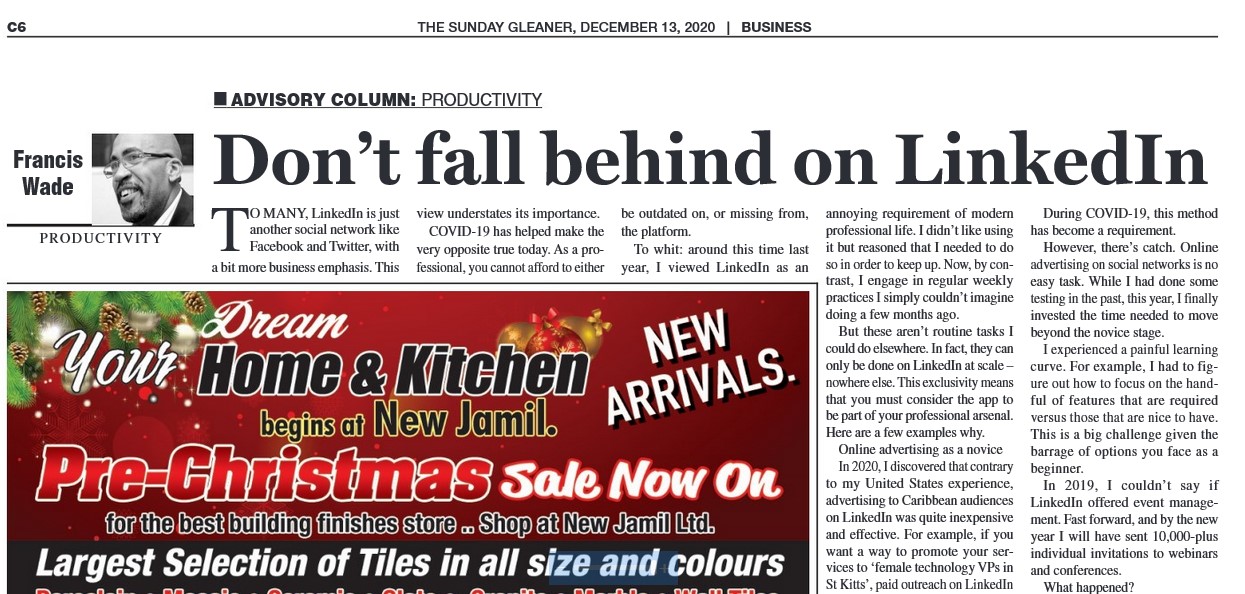To many, LinkedIn is just another social network like Facebook and Twitter, with a bit more business emphasis. This view understates its importance. COVID-19 has helped make the very opposite true today: as a professional you cannot afford to either be outdated on, or missing from, the platform.
To whit: around this time last year, I viewed LinkedIn as an annoying requirement of modern professional life. I didn’t like using it, but reasoned that I needed to do so in order to keep up. Now, by contrast, I engage in regular weekly practices I simply couldn’t imagine doing a few months ago.
But these aren’t routine tasks I could do elsewhere. In fact, they can only be done on LinkedIn at scale…nowhere else. This exclusivity means that you must consider the app to be part of your professional arsenal. Here are a few examples why.
1. Online Advertising as a Novice
In 2020, I discovered that, contrary to my US experience, advertising to Caribbean audiences on LinkedIn was quite inexpensive and effective. For example, if you want a way to promote your services to “female technology VP’s in St Kitts”, paid outreach on LinkedIn is by far the best way to reach this narrow segment.
I also learned that the platform’s ads do more than “sell” – they build relationships, an all-important ingredient in the
Caribbean. In other words, these promotions allow you to create bridges to people who don’t know you personally, and construct the “weak ties” research shows are critical in business.
During COVID-19, this method has become a requirement.
However, there’s catch. Online advertising on social networks is no easy task. While I had done some testing in the past, this year I finally invested the time needed to move beyond the novice stage.
I experienced a painful learning curve. For example, I had to figure out how to focus on the handful of features which are required vs. those which are nice to have. This is a big challenge given the barrage of options you face as a beginner.
2. Events and the Changing Limits
In 2019, I couldn’t say if LinkedIn offered event management. Fast forward…and by the new year, I will have sent 10,000+ individual invitations to webinars and conferences.
What happened?
By a stroke of luck, I stumbled across the platform’s revamped event feature, which at one point allowed me to invite as many connections as I wanted. Now, the company has caught on and imposed a limit of 1,000 people per occasion. While this has cost me dearly, they have added a new element – bulk invitations – which makes the task easier.
This free function is perfect for these pandemic times in which all of us need to up-level our skills, via online methods of learning. Today, we just don’t have a choice if we hope to remain relevant.
As such, through its events feature, LinkedIn offers a unique, scalable business service.
3. Networking
Old-style networking involved meeting people in person and handing out business cards in the hope of being remembered. COVID-19 halted this approach.
Today, there’s no easier way than LinkedIn to build a trusted network. Furthermore, exchanging useful information for mutual benefit becomes a fruitful game to be played over decades, leveraging the platform’s ability to create relationships at scale.
Unfortunately, if your account is out of date or you don’t even have one, you risk sending a silent message: “I don’t care about building relationships.”
While you may think that the way you use LinkedIn is a matter of style, the effect of your actions has now moved out of your hands. Whereas a preference not to employ that platform could have been a personal quirk a few years ago, today it’s fast becoming the digital equivalent of “never carrying my business cards” or “not believing in resumes.”
In other words, it’s weird.
The fact is, all the practices I have mentioned above are new norms over which you have little influence. Everything you do online (or fail to do) sends a message. Consequently, I have personally declined to refer colleagues for opportunities with serious people due to a missing or mismanaged profile. I just pick someone else and keep moving.
My fear is that if you have decided LinkedIn isn’t important, you may not be paying attention to the latest developments. If so, stop falling behind and get into the game, setting aside any tired pre-conceptions. Instead, adapt to an emerging reality you can’t afford to ignore and take the necessary actions to bring yourself up to date.

